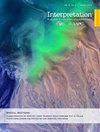Log-Constrained Inversion Based on CGPSO Algorithm
IF 1
4区 地球科学
Q3 GEOCHEMISTRY & GEOPHYSICS
Interpretation-A Journal of Subsurface Characterization
Pub Date : 2023-05-22
DOI:10.1190/int-2022-0109.1
引用次数: 0
Abstract
Well-logging-constrained impedance inversion is an effective process for predicting the thickness and bifurcation of coal seams. Wavelet changes in a complex region achieve the best match between the inverse and source wavelets, affecting the accuracy of the inversion solution and the ability to obtain accurate inverted acoustic impedance (AI) data. We have conducted the joint inversion of wavelet and AI data using iterative methods, which combined the conjugate gradient (CG) method and particle swarm optimization (PSO) algorithm. The Marmousi AI model was used to prove the reliability of the method. The CG-PSO algorithm achieved excellent results compared with the statistical wavelet pickup method. The wavelet obtained by the CG-PSO algorithm is preferred for inversion operations. We applied a new method to invert field data and predict the thickness and bifurcation of coal seams in the karst region. The results find that the wavelet spectrum obtained by the CG-PSO matches the spectrum map of the coal seam in the Yuwang colliery. We determined the distribution of the thickness and bifurcation of the 101 panel, Yuwang Colliery, Yunnan Province. The average error of the predicted coal thickness is 0.17 m (14.4%), which verifies the feasibility and effectiveness of the method. The method provides insights into the AI inversion of constrained waves in complex regions.基于CG-PSO算法的对数约束反演
测井约束阻抗反演是预测煤层厚度和分岔的有效方法。复杂区域的小波变化实现了逆波和源波的最佳匹配,影响了反演解的精度和获得准确的逆声阻抗(AI)数据的能力。我们结合共轭梯度(CG)法和粒子群优化(PSO)算法,采用迭代方法对小波和人工智能数据进行联合反演。通过Marmousi AI模型验证了该方法的可靠性。与统计小波提取方法相比,CG-PSO算法取得了很好的效果。CG-PSO算法得到的小波是首选的反演操作。应用一种新的反演野外资料的方法,对岩溶区煤层厚度和分岔进行了预测。结果表明,利用CG-PSO得到的小波谱与禹王煤矿煤层的谱图吻合较好。我们确定了云南玉王煤矿101面板的厚度和分岔分布。预测煤厚的平均误差为0.17 m(14.4%),验证了该方法的可行性和有效性。该方法为复杂区域约束波的人工智能反演提供了见解。
本文章由计算机程序翻译,如有差异,请以英文原文为准。
求助全文
约1分钟内获得全文
求助全文
来源期刊

Interpretation-A Journal of Subsurface Characterization
GEOCHEMISTRY & GEOPHYSICS-
CiteScore
2.50
自引率
8.30%
发文量
126
期刊介绍:
***Jointly published by the American Association of Petroleum Geologists (AAPG) and the Society of Exploration Geophysicists (SEG)***
Interpretation is a new, peer-reviewed journal for advancing the practice of subsurface interpretation.
 求助内容:
求助内容: 应助结果提醒方式:
应助结果提醒方式:


